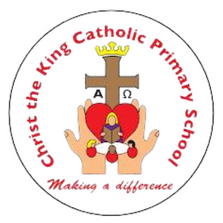GEOGRAPHY
Our Mission Statement
'Making a difference by inspiring a love of life and learning for all. We build strong foundations within God's loving hands'.
Our Core Values
We provide a Catholic Christian education based on the life and teaching of Jesus Christ. Our Core Values. Our Core Values are inspired by Gospel values and stem from love - love is forgiveness, sharing and kindness. They are:
- Responsibility
- Compassion
- Respect
- Honesty
- Perseverance
- Courage
At Christ the King Catholic Primary School we inspire our children to have a lifelong love of learning through a broad, enriched and balanced curriculum. We aspire for all children to be the best they can be and make a difference to our world by building strong foundations within God’s loving hands.
Our Approach, Aim, and Curriculum
Our key curriculum drivers are:
- Inclusivity
- Creativity
- Curiosity
- Oracy
Intent
At Christ the King Catholic Primary School, we aim to inspire a lifelong curiosity about the world. Teaching should give pupils the knowledge linked to places, people, resources and natural and human environments and the key physical and human processes. Pupils will learn about the locations of the world’s continents, countries, cities, seas and oceans. Skills taught will cover interpreting sources of geographical information, including maps, diagrams, globes, aerial photographs and geographical information systems (GIS). Geography learning will be linked to other subject areas where applicable, developing our cross-curricular approach. The National Curriculum informs our chosen topics, which are sequential and include progression of skills. They aim to enhance pupil knowledge about their local area and the wider world and develop pupils as global citizens. Children will understand how Catholic virtues and British Values relate to Geography. There will be opportunities beyond the classroom for real life learning and for pupils to visit places they may not otherwise visit.
Implementation
Geography is taught in blocks throughout the year so that children develop a deep and secure understanding. There are also links between geography and other areas of the curriculum where appropriate and where it adds value to both the subjects. Skills are built on year on year and sequenced appropriately throughout the school and lessons are planned using this document. Monitoring occurs regularly by the Curriculum Leads.
Cultural capital will be developed through studies of places of significant geographical interest such as Stone Henge, Skara Brae, the North and South Poles and the World’s Rainforests. Famous geographers such as David Attenborough and Ernest Shackleton will also be studied.
Each topic has a knowledge organiser which is shared with children and parents. There is also an entry/exit quiz as a method of assessment. Geography lessons are scaffolded for those that need support to provide equity in provision and to maintain high standards of achievement for all pupils. Where our topics have a link to local geography pupils go on trips to and have visits from local experts to enhance the learning experience.
Impact
By the time pupils leave they will:
- Have good age appropriate knowledge of where places are and what they are like.
- Have an understanding of the ways in which places are interdependent and interconnected and how much human and physical environments are interrelated.
- Have a solid base of geographical knowledge and vocabulary.
- Be fluent in geographical enquiry and the ability to apply questioning skills and use effective analytical and presentational techniques.
- Have the ability to reach clear conclusions and develop a reasoned argument to explain findings.
- Have good skills in fieldwork and geographical techniques.
- Have the ability to express well-balanced opinions, rooted in very good knowledge and understanding about current and contemporary issues in society and the environment.
- Have a passion for geography, and a real sense of curiosity to find out about the world and the people who live there.
We will measure the impact of our curriculum through the following methods:
- Assessment before and after using entry and exit quizzes based on the knowledge organisers.
- Summative assessment of pupil discussions
- Images and videos of practical learning
- Pupil voice
- Moderation staff meetings
- Marking of written work in books

